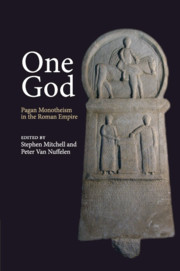Book contents
- Frontmatter
- Contents
- Preface and acknowledgements
- List of abbreviations
- 1 Introduction: the debate about pagan monotheism
- 2 Pagan monotheism as a religious phenomenon
- 3 Pagan ritual and monotheism
- 4 The case for pagan monotheism in Greek and Graeco-Roman antiquity
- 5 Monotheism between cult and politics: the themes of the ancient debate between pagan and Christian monotheism
- 6 The price of monotheism: some new observations on a current debate about late antiquity
- 7 Megatheism: the search for the almighty god and the competition of cults
- 8 Deus deum … summorum maximus (Apuleius): ritual expressions of distinction in the divine world in the imperial period
- 9 Further thoughts on the cult of Theos Hypsistos
- Bibliography
- General index
- Index of authors, works and citations
8 - Deus deum … summorum maximus (Apuleius): ritual expressions of distinction in the divine world in the imperial period
Published online by Cambridge University Press: 20 May 2010
- Frontmatter
- Contents
- Preface and acknowledgements
- List of abbreviations
- 1 Introduction: the debate about pagan monotheism
- 2 Pagan monotheism as a religious phenomenon
- 3 Pagan ritual and monotheism
- 4 The case for pagan monotheism in Greek and Graeco-Roman antiquity
- 5 Monotheism between cult and politics: the themes of the ancient debate between pagan and Christian monotheism
- 6 The price of monotheism: some new observations on a current debate about late antiquity
- 7 Megatheism: the search for the almighty god and the competition of cults
- 8 Deus deum … summorum maximus (Apuleius): ritual expressions of distinction in the divine world in the imperial period
- 9 Further thoughts on the cult of Theos Hypsistos
- Bibliography
- General index
- Index of authors, works and citations
Summary
Some, throwing out all the others, grant rulership over the universe to one god alone (ἑνὶ μόνῳ τὴν τῶν ὅλων ἀρχὴν) … But others, less greedily, assure us that there are several. They divide them into classes, call one the first god (τὸν μέν τινα πρῶτον θεόν) and assign the second and the third rank of divinity (τῆς θεότητος) to the others.
(Lucian, Icaromenippos 9)The hermeneutic investigation of how religion evolved in late antiquity has expanded since historians widened their cognitive concepts by deploying approaches to the problems drawn from the social sciences. Students of late antique religion have now begun to ask questions about the fabric of polytheisms (how and why a god, ‘all the gods’ or the god are constructed), about their structures, and how they functioned. Since these divine worlds were open to change and naturally adaptable, the configurations of the evidence throw light on empirical processes – a sort of bricolage – that are determined by context rather than matters of dogma. Such research, in a word, is concerned with religion's dynamic development. The ‘organigramme’ of the pantheon that is invoked is always specific to the occasion or the place where it occurs, even if its starting point consists in a hierarchical representation fixed by institutions or conventions. Accordingly, the construction or reconstruction of the pantheon was a continuous process, which might modify the hierarchical order case by case, add new divine figures, or modify the outline of old ones.
- Type
- Chapter
- Information
- One GodPagan Monotheism in the Roman Empire, pp. 141 - 166Publisher: Cambridge University PressPrint publication year: 2010
- 5
- Cited by



